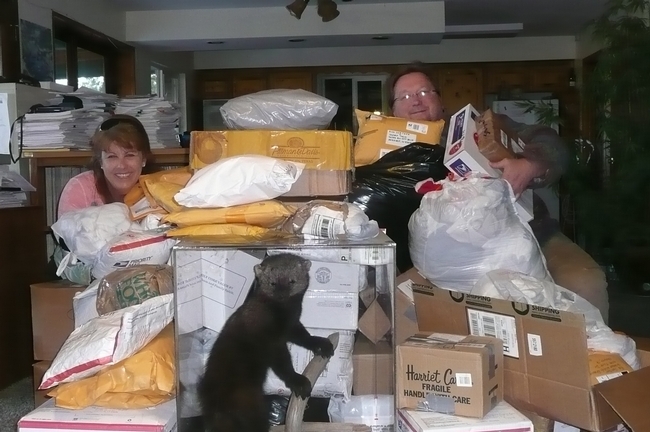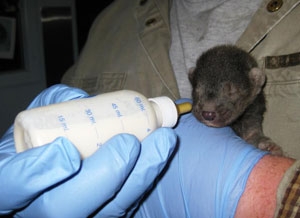Posts Tagged: Pacific fisher
Roadkill is a serious threat to rare wildlife populations
Why shouldn’t the chicken cross the road? Because statistics show it is very likely she will be run over! According to the Humane Society of the United States, over a million animals die on our roads every day.
Wildlife statistics gathered by the California Roadkill Observation System created by the Road Ecology Center at UC Davis have recorded almost 22,000 animal deaths on California roads in the last four years. Roads are an additional danger beyond those that Mother Nature already has in store for the wildlife of our state and it is one we bear the responsibility for. The loss of each animal affects its population numbers, it reproductive capacity and any babies left behind in its nests. But if an animal does not cross roads, it can result in genetic isolation in wildlife populations and loss of habitat.
For the Pacific fisher research team of the Sierra Nevada Adaptive Management Project (SNAMP), roadkill is very much a concern. They have been tracking the Pacific fisher, a nocturnal forest dwelling weasel, in the southern Sierra for the last five years. Their goal has been to identify the effects that forest thinning in may have on the fisher. In their careful tracking, they have recorded the deaths of nine of these rare animals on Highway 41, which cuts through the study area on its way to Yosemite. This is an important number considering the isolated population is estimated to be only about 300 individuals south of the Merced River; and these are only the roadkill incidents we know about.
In the team’s search for solutions to the roadkill issue, they have assembled a Wildlife-Vehicle Collision Group with the Forest Service, Yosemite National Park, Defenders of Wildlife and Caltrans to search for any possible solutions. Members of the SNAMP Wildlife Team put cameras in culverts passing beneath Highway 41 from Oakhurst to Yosemite to see if they were being used as a possible alternate route. (For details see the Sierra Nevada Highway Culvert Product, pdf). The good news is that many animals, including fisher, were found to be using road culverts to pass beneath the road, avoiding collisions with cars. This provides some hope that maintenance of the entrances and exits of existing culverts offers a safe alternative to road crossing for wildlife.
UC's 'viral' sock drive appears on the Bee's front page
Who would have thought old socks could drive a media storm? A call from participants in UC's Sierra Nevada Adaptive Management Project for donations of gently used socks for Pacific fisher research generated a flurry of response, and now the overwhelming public response resulted in a front-page story in the Sacramento Bee. The article also ran on the front page of the Fresno Bee.
Bee writer Matt Weiser reported that bulging padding envelopes and duct-taped boxes filled with socks trickled in at first. In time, boxes of socks from Girl Scout troops and elementary schools forced the researchers to wheel their mail from the post office in carts.
"We basically generated several truckloads," said UC Berkeley associate adjunct professor Rick Sweitzer. "It was incredible."
Sweitzer said Weiser had called him last week to ask about porcupines in California. Weiser said he and his wife had sent socks themselves last December. When he heard about the unexpected outpouring of socks, he turned his immediate attention to telling that story.
Two animal updates in the Merced Sun-Star
News about animals under study in distinct branches of UC Agriculture and Natural Resources were featured recently in the Merced Sun-Star. A female Pacific fisher being tracked in the Sierra Nevada by UC Berkeley scientists has established a den within Yosemite National Park, the paper reported. Meanwhile, UC Davis scientists are joining in research with Michigan State University to study the housing of egg-laying hens, another story said.
Researchers with the Sierra Nevada Adaptive Management Program Fisher Project track fishers, endangered members of the weasel family, using radio-telemetry. The Yosemite fisher was first captured in October 2009 in the Sierra National Forest and remained near the capture site for nearly a year. Recently, the fisher moved her kits to a den on the south side of Yosemite.
This is the first fisher that is part of the study to make a home within park boundaries.
In the chicken story, the newspaper reported that UC Davis and Michigan State received $6 million for the study from the Coalition for Sustainable Egg Supply, a group made up mostly of egg producers, purchasers and universities with major agriculture programs.
The research will compare three approaches to chicken housing:
- Conventional cage housing, now used by most U.S. egg producers.
- Enriched cage housing, larger than conventional cages and equipped with perches, nesting areas and foraging/dust-bathing materials.
- Cage-free aviary, a non-cage system that enables hens to roam along a building's floor level and have access to perches and nest boxes.
"The information gained will be useful to all consumers as they make decisions about what kinds of eggs to buy," the story quoted Joy Mench, a UC Davis animal science professor and director of the Center for Animal Welfare.

Pacific fisher, left, dens in Yosemite. UC Davis launches chicken housing study.
Four baby fishers to be closely monitored by scientists
Four Pacific fisher kits who were returned to the wild last week will be closely monitored by UC Berkeley wildlife biologists who are interested in knowing how the animals assimilate to the forest after being reared in captivity, according to the Fresno Bee.
The kits were rescued last May, when their mothers - part of a multi-year Pacific fisher study - were killed, one by a bobcat, the other by a car. UC Berkeley wildlife biologist Rick Sweitzer delivered the animals to the Fresno Chaffee Zoo, where they were nursed to health.
Zoo veterinarian Lewis Wright told Bee reporter Marc Benjamin that zoos are preferable to ordinary veterinary hospitals for weasel-like fishers because the wild animals are susceptible to dog and cat illnesses. The juvenile fishers were later pen reared near Bass Lake.
The fisher rescue and release became part of the seven-year Sierra Nevada Adaptive Management Project, in which fishers are fitted with radio transmitter collars and monitored to study their fate in a forest ecosystem subject to timber harvest and development.
Currently 23 fishers are monitored daily. Scientists surgically implanted transmitters in the four fishers released last week to eliminate the risk of losing their collars.

A fisher peeks out of a temporary enclosure during release.
Pacific fisher orphans on Fresno TV
Five Pacific fisher orphans were featured on Fresno's KSEE Channel 24 news last Friday. The story includes great video of the five tiny, weasel-like animals now being cared for at the Fresno Chaffee Zoo.
The orphaned fishers were rescued by an Oakhurst-based UC Berkeley team that is studying the Pacific fisher population in the southern Sierra Nevada. The animals are the offspring of two fisher females that were part of the study. One was killed by a bobcat, the other hit by a car. Get all the rescue details in this UC news release.
Unfortunately, the Channel 24 story omitted the fact that researchers are looking for support from the community to care for the fishers so they can be returned to the wild. To make a contribution for milk replacement formula and supplies to build a temporary habitat, contact Anne Lombardo of UC Cooperative Extension at amlombardo@ucdavis.edu, (559) 676-0576.
The Pacific fisher story also appeared in the Sierra Sun Times and Yubanet.com.

UC research crew member uses tree climbing equipment to reach orphan fishers in an unstable snag.




